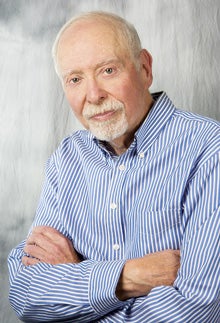Sports and Discrimination
 Robert G. Weisbord, a URI professor for 46 years who retired in 2013 and the author of six books including his latest, Racism and the Olympics, talks about how social issues and sports intertwine:
Robert G. Weisbord, a URI professor for 46 years who retired in 2013 and the author of six books including his latest, Racism and the Olympics, talks about how social issues and sports intertwine:
Congratulations on your new book. What inspired you to write it?
I’m a huge sports fan. I was a mediocre athlete growing up in Washington Heights in New York City, but as a spectator I’m a fan of baseball, basketball and football. More important, I’m interested in racism, and that includes racism in sports.
The black power salute in the 1968 Olympics shocked America. Did you support it?
Yes. It was a dignified and brief protest that in no way was disruptive of the games. It was a way of saying that blacks were oppressed in America and that something had to be done about it. Americans’ outrage was hypocritical. After George Foreman won the gold medal he ran around the ring carrying a small American flag, and there were no protests of that demonstration.
What happened to the athletes, Tommie Smith and John Carlos?
The controversy had a negative effect on their marriages, and they found it very difficult to get gainful employment. Tommie Smith was reduced to washing cars. Both are still alive. I don’t think the relationship between them is very good.
Could something as horrible as Hitler’s snub of track star Jesse Owens at the 1936 Olympics in Berlin happen today?
No. There’s more awareness of racial sensitivities. Back then, Hitler made it clear that he didn’t like black athletes winning medals for the United States.
In your book you write about the polarizing International Olympic Committee presidency of Avery Brundage. Tell us about him.
He was a negative force in the Olympics. He was overly combative and conservative on a number of issues, not just race. He stayed too long, yet he remains the single most dominant personality in the Olympic movement in the 20th century.
Is there racism in the Olympics today?
The kinds of problems the games have today are more likely to be connected to issues such as the role of gay athletes and women participants, especially from the Middle East.
What criteria should be used to determine whether a country participates in the games?
The Olympic community should strive for universal participation, but there should be stringent requirements for hosting the games. In the worst cases, I wouldn’t let a country participate in the Olympics either. That’s why I supported banning South Africa and Rhodesia in the 1960s and 1970s.
What do you think of the FIFA scandal tarnishing soccer? Are professional sports too greedy?
I think an attempt should be made to eliminate greed as much as possible. Everything has to be transparent. That’s crucial.
Are you enjoying your retirement?
Sure. I love it, but I miss the teaching to tell you the truth. I miss the students. I had a grand time at URI.
 Home
Home Browse
Browse Close
Close Events
Events Maps
Maps Email
Email Brightspace
Brightspace eCampus
eCampus


